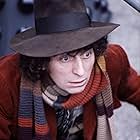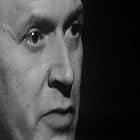Aboard a hyperspace prison ship, two justice machines called the Megara, known for swift verdicts and harsh punishments, arrest the Doctor for breaking an infraction, with trial and executio... Read allAboard a hyperspace prison ship, two justice machines called the Megara, known for swift verdicts and harsh punishments, arrest the Doctor for breaking an infraction, with trial and execution to be carried out immediately.Aboard a hyperspace prison ship, two justice machines called the Megara, known for swift verdicts and harsh punishments, arrest the Doctor for breaking an infraction, with trial and execution to be carried out immediately.
- Director
- Writers
- All cast & crew
- Production, box office & more at IMDbPro
Storyline
Did you know
- TriviaTom Baker, Mary Tamm and Susan Engel were scathing about this episode on the DVD commentary. Baker described it as "the longest episode in the history of Doctor Who", Tamm said they deserved medals for having sat through it and Engel questioned how it could even have been transmitted.
- GoofsBoom pops into frame from above when Romana shows Professor Rumford the annotated cookery books.
Featured review
In Part One of "The Stones of Blood," Romana was pushed off a cliff; in Part Three, one of the Ogri stone monsters tumbled off a cliff; and in Part Four, the entire serial plunges off a cliff, dragging this third installment in Season 16's "Key to Time" saga straight down to the rock bottom.
David Fisher's often lively tale of dagger-wielding Druids plotting blood sacrifices for the Cailleach in the Cornwall countryside as the Doctor and Romana search for the third segment to the Key to Time leaps into hyperspace and promptly collapses into dragged-out desperation before cobbling together a rushed, unsatisfactory summation that is surprisingly callous toward the fate of one of the characters, with that pesky third segment hardly an afterthought.
Having inadvertently freed the Megara justice machines (voiced by Gerald Cross and David McAlister) trapped in a cell aboard the prison ship hovering in hyperspace above the Nine Travelers stone circle (and is thus invisible to Earthbound observers), the Doctor quickly learns that doing so without the proper authorization is punishable by death. The Megara, depicted as balls of light that dance about when they squeak-speak to each other, intend to execute the Doctor posthaste once they have tried him for the crime.
Why the Megara, who had been en route to the planet Diplos to administer similar frontier-style justice to a miscreant named Cessair, whose crimes include stealing the Great Seal of Diplos, when the prison ship "ran aground" on Earth, had been locked in a cell in the first place remains a puzzle. Aren't they supposed to be on the good side of the law they fetishize so much?
In any event, the Doctor, Romana, and Vivien Fay (Susan Engel), who in her transition to hyperspace somehow turned silver, experience Megaran justice up close and personal as the Doctor is quickly tried and found guilty but soon wangles his way out of being executed, at least temporarily, by demanding an appeal. Or something. And after Romana testifies at this new proceeding, she escapes back to Earth to join forces with archaeologist Emilia Rumford (Beatrix Lehmann) to dig up exposition to explain to viewers just what the---
---Do you get the feeling that David Fisher woke up late on the day of filming and had to throw together a script at the last minute? Too much of Part Four is given over to the Megara's interminable courtroom procedural, with so many actions punishable by death that it becomes an eye-rolling running joke. In the end, the Doctor is still found guilty, a flash renders both him and Vivien unconscious, and then comes labored contrivance revealing that Cessair is actually---let's just say there is no silver lining here.
Back on Earth, more hasty pudding is cooked to serve up the remaining missing story elements before the Doctor and Romana say goodbye to a somewhat befuddled Emilia and beat a hasty retreat from this narrative disaster to search for the next segment. Emilia is somewhat delighted that another stone monolith has been added to the Nine Travelers, seemingly unperturbed by the knowledge that that stone monolith contains someone imprisoned inside it in perpetuity, a "cat among the pigeons" to confound those who had surveyed the circle and counted nine figures. (But for those keeping score at home, subtract two confirmed kills and one missing in action.)
Delivering a full-blooded adventure with its first two parts, "The Stones of Blood" ultimately turns anemic before it is fully drained of globulin in this impressively disappointing conclusion.
REVIEWER'S NOTE: What makes a review "helpful"? Every reader of course decides that for themselves. For me, a review is helpful if it explains why the reviewer liked or disliked the work or why they thought it was good or not good. Whether I agree with the reviewer's conclusion is irrelevant. "Helpful" reviews tell me how and why the reviewer came to their conclusion, not what that conclusion may be. Differences of opinion are inevitable. I don't need "confirmation bias" for my own conclusions. Do you?
David Fisher's often lively tale of dagger-wielding Druids plotting blood sacrifices for the Cailleach in the Cornwall countryside as the Doctor and Romana search for the third segment to the Key to Time leaps into hyperspace and promptly collapses into dragged-out desperation before cobbling together a rushed, unsatisfactory summation that is surprisingly callous toward the fate of one of the characters, with that pesky third segment hardly an afterthought.
Having inadvertently freed the Megara justice machines (voiced by Gerald Cross and David McAlister) trapped in a cell aboard the prison ship hovering in hyperspace above the Nine Travelers stone circle (and is thus invisible to Earthbound observers), the Doctor quickly learns that doing so without the proper authorization is punishable by death. The Megara, depicted as balls of light that dance about when they squeak-speak to each other, intend to execute the Doctor posthaste once they have tried him for the crime.
Why the Megara, who had been en route to the planet Diplos to administer similar frontier-style justice to a miscreant named Cessair, whose crimes include stealing the Great Seal of Diplos, when the prison ship "ran aground" on Earth, had been locked in a cell in the first place remains a puzzle. Aren't they supposed to be on the good side of the law they fetishize so much?
In any event, the Doctor, Romana, and Vivien Fay (Susan Engel), who in her transition to hyperspace somehow turned silver, experience Megaran justice up close and personal as the Doctor is quickly tried and found guilty but soon wangles his way out of being executed, at least temporarily, by demanding an appeal. Or something. And after Romana testifies at this new proceeding, she escapes back to Earth to join forces with archaeologist Emilia Rumford (Beatrix Lehmann) to dig up exposition to explain to viewers just what the---
---Do you get the feeling that David Fisher woke up late on the day of filming and had to throw together a script at the last minute? Too much of Part Four is given over to the Megara's interminable courtroom procedural, with so many actions punishable by death that it becomes an eye-rolling running joke. In the end, the Doctor is still found guilty, a flash renders both him and Vivien unconscious, and then comes labored contrivance revealing that Cessair is actually---let's just say there is no silver lining here.
Back on Earth, more hasty pudding is cooked to serve up the remaining missing story elements before the Doctor and Romana say goodbye to a somewhat befuddled Emilia and beat a hasty retreat from this narrative disaster to search for the next segment. Emilia is somewhat delighted that another stone monolith has been added to the Nine Travelers, seemingly unperturbed by the knowledge that that stone monolith contains someone imprisoned inside it in perpetuity, a "cat among the pigeons" to confound those who had surveyed the circle and counted nine figures. (But for those keeping score at home, subtract two confirmed kills and one missing in action.)
Delivering a full-blooded adventure with its first two parts, "The Stones of Blood" ultimately turns anemic before it is fully drained of globulin in this impressively disappointing conclusion.
REVIEWER'S NOTE: What makes a review "helpful"? Every reader of course decides that for themselves. For me, a review is helpful if it explains why the reviewer liked or disliked the work or why they thought it was good or not good. Whether I agree with the reviewer's conclusion is irrelevant. "Helpful" reviews tell me how and why the reviewer came to their conclusion, not what that conclusion may be. Differences of opinion are inevitable. I don't need "confirmation bias" for my own conclusions. Do you?
- darryl-tahirali
- Jan 3, 2024
- Permalink
Details
Contribute to this page
Suggest an edit or add missing content











